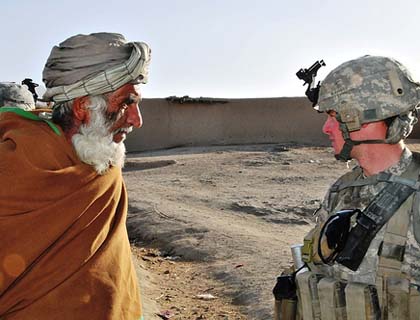Afghanistan and the United Statesare about to sign a much-talked talked about and anticipated strategicpartnership. Much has been said and talked about this deal. At a minimum, theAmerican side is pushing for keeping a relatively small contingent of troops inAfghanistan beyond the point when the combat operations by Americans would endand they move into largely support positions.
As the number of military troopswould drastically come down, the number of undercover intelligence operativesbelonging to the Central Intelligence Agency and other spy organizations wouldbe boosted. As reported by Washington Post recently, the CIA is planning andpreparing for a major upgrade of force levels and resources in Afghanistan topartly make up for the drastic reduction in troops numbers on the ground.
In2013 and beyond, this heightened intelligence footprint would make Afghanistaninto CIA's largest overseas engagement since the Cold War years. However, thefinal outcome is dependent on the status of Afghan-American relations.
Theprerequisite for the U.S. to be able to maintain a military presence beyond2014 is the signing of the strategic agreement. If eventually signed, theagreement would allow the U.S. to maintain a troop level of 10,000 to 3,000 onthe ground in Afghanistan well beyond 2014. The U.S. is single-mindedlypursuing this and cannot afford to be treated in Afghanistan the way it wastreated in Iraq where it was effectively kicked out of that country.
Under these circumstances, theMassacre of Kandahar was the last thing that the U.S. would wish for. The pastfew days have been a nightmare for the U.S. military's top brass in Afghanistan.The surprise visit by the American Defense Secretary, Leon Panetta, to Helmandvividly encapsulates what is happening on the ground.
In the hall where Mr.Panetta was scheduled to meet with and talk to American and Afghan militarypersonnel, reportedly, Afghan soldiers were not allowed to bring their weaponsinside the meeting hall. American soldiers too were asked to leave theirweapons outside. Such dramatics were not seen before. It only shows the extentof the erosion of confidence especially after sporadic killings of foreignsoldiers by Afghan troops is turning into a new normal.
The Massacre of Kandahar hascontributed a great deal to the deterioration of the situation. It has resultedinto a strong wave of anti-American sentiments starting to rage beneath thesurface. The U.S. and its military are indeed overestimating the extent of people'sfavorable perception and are now gradually coming to terms with changingrealities.
The happenings in Kandahar has been the work of a lone soldier whohad lost mental balance but it is directly tensing up the situation and makingthe task of the U.S. in Afghanistan more difficult. It has been a boost to thecause of Taliban and has made them bolder in their anti-American rhetoric. Thesituation might easily spiral out of control if damage is not contained andfuture incidents prevented.
The mood in Europe is alsochanging. The German Chancellor, Angela Merkel, made a surprise visit to Mazar-eSharif and met with German troops where she sought to boost the morale of aforce that has become disillusioned with the war in Afghanistan to some extent.
The kind of unease that the European capitals are experiencing is palpable andevident in the behavior of European leaders. The Europe might very well be waitinganxiously for the exit gates from Afghanistan to be flung open. The publicopinion is weighing against staying the course in Afghanistan and the Europeanpoliticians and statesmen can no longer disregard the public mood withoutsuffering the political consequences.
The question that arises here iswhether or not the long-term Afghan-American relations and for that matter,Afghan-NATO relations will survive the latest hits that have the potential forderailing the whole train. Public opinions in Afghanistan is and has alwaysbeen an important factor in the political and military calculus of American andits NATO allies.
Now that there is an ongoing trend of a tilt in public opinionagainst the presence of international military coalition in Afghanistan, theU.S. can no longer disregard this factor. It is important that the U.S. seekthe root causes of this palpable shift in public opinion and explore the set ofdeeper reasons as to why the U.S.-led NATO efforts in Afghanistan are in deep trouble.
Introspection and doing away with previous paradigms and assumptions regardingAfghanistan and the war must be given a weight and pondered upon. That would bethe only way to prevent further deterioration in the Afghan public opinionregarding the presence of international military coalition. The situationshould be handled effectively and wisely and for this purpose, broader and moreencompassing ideas and solutions must be sought. After all, the internationalcommunity including the U.S. and the international military coalition are fightingto win the perceptions. Shaping and retaining favorable perceptions lie at theheart of the efforts in Afghanistan.
The government of President HamidKarzai would do its best to extract the most out of the strategic deal with theU.S. The responsibility for all the American-handled prisons in Afghanistanwill be handed over to the government of Afghanistan as per a recent agreement.
It was a major win for the government of President Karzai that went largelyunnoticed in the media. On the same lines, President Karzai and his team arehaggling with Americans over some of the most important issues of the strategicdeal and, perhaps, much more needs to be explored and haggled before the dealbecomes acceptable to both parties.
The Americans are having a tough timedealing with Arg. It is evident in the contradictory statements released regardingthe status of the deal and whether or not it has been finalized. The governmentof President Karzai knows that it needs long-term American involvement inAfghanistan while it is doing its utmost to increase its leeway and its roomfor maneuvering over some of the most vital issues contained in the agreement. Beforethe preparations for the presidential elections in the U.S. reach final stages,the Obama Administration would like to see the agreement signed.

